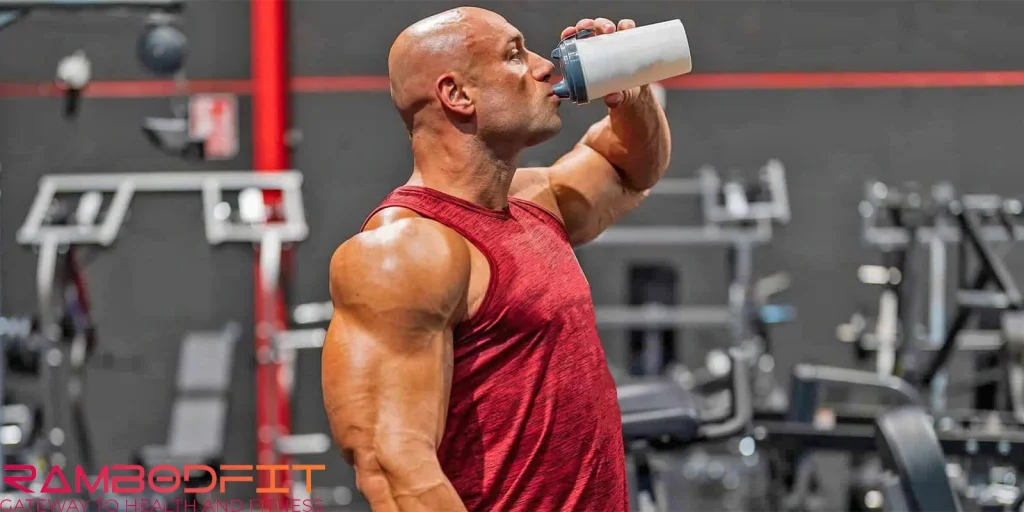


When you walk down the supplement aisle or browse fitness chats online, picking the right protein supplement can feel confusing. Is BCAA the best? Should you go for EAA? Alternatively, does sticking with whole protein like whey make more sense?
This question puzzles beginners, experienced lifters, bodybuilders, and even trainers. Advertisements make it harder. BCAA is praised for quick recovery, EAA is called the complete amino option, and whey is treated like the ultimate standard.
At Rambodfit, let us dive into the details of the comparison of whole protein vs EAA vs BCAA, cut the unnecessary talk, and settle the muscle-building debate.

Here’s the deal: Proteins aren’t all the same, and knowing the science behind each type can affect your progress, recovery, and overall performance in the long run. That’s why a proper comparison of whole protein vs EAA vs BCAA is essential.
What Exactly Are BCAAs? BCAAs stand for Branched Chain Amino Acids. They make up three of the nine essential amino acids:
These three have a “branched” structure and skip the liver to break down right in the muscles. Out of the group, leucine stands out the most—it acts like the key that starts muscle protein creation using the mTOR pathway.
Why BCAAs Work Well Picture BCAAs as the key to turning on a car. Leucine starts the muscle-building engine by triggering the protein-building process. That’s why lots of workout supplements taken during or after training highlight their BCAA content. They provide that quick anabolic spark.
They can also:
But if we go for a comparison of whole protein vs EAA vs BCAA is essential, it becomes clear that BCAA alone can’t do the full job.
But there’s a Twist. Here’s where people often mess up: BCAAs by themselves don’t build muscle. They’re like trying to light a campfire without any wood. You might get a tiny spark, but you won’t keep the fire going. To build and repair muscle, your body needs all the essential amino acids, not just BCAAs.
The Overlooked Reality Using BCAAs alone—if you skip having complete proteins or essential amino acids—throws off the amino acid balance in your blood. In serious situations, this can even push your body into breaking down muscle for energy, a state called catabolism.
So, What Are EAAs? Essential Amino Acids, also called EAAs, include the nine amino acids your body cannot make by itself. These are made up of the three BCAAs along with six others like lysine, methionine, and phenylalanine.
Together, these amino acids make up everything your body needs to build muscle proteins. That’s what sets them apart in the comparison of whole protein, EAA, and BCAA.
Why EAAs Work Better. EAA supplements don’t just start the process like BCAAs do. They bring everything your body needs to get the job done. Your body absorbs them because they don’t need digestion the way regular protein powders do. This makes them a smart pick:
EAAs can boost muscle protein building just as much as whey can. They do this without adding extra calories, carbs, or making digestion take longer.
The Drawback Although EAAs provide all the essential amino acids, they do not include some non-essential ones like glutamine, glycine, and arginine. These may not start muscle protein synthesis, but they are still important. They help with antioxidant production like glutathione, maintaining gut health, and supporting the immune system.
In the broader comparison of whole protein vs EAA vs BCAA is essential that’s where EAA may fall short.
Hidden Fact: In some cases, EAAs might work better than whey. This happens in situations like aging, eating fewer calories, or having trouble digesting food, since EAAs are more absorbed by the body.

What Does Whole Protein Mean? Whole protein, like whey, includes essential and non-essential amino acids. It also has bioactive peptides, immunoglobulins, and lactoferrin. These nutrients help keep the body in good health.
Whey comes from milk during cheese production and exists in three types:
Why Whey Is Great for Muscles: Whey protein:
Does more than trigger MPS. It keeps it going, aids your immune system, helps balance hormones, and lessens oxidative stress after hard workouts.
As we look at the comparison of whole protein, EAA, and BCAA, whey stands strong for total recovery and muscle support.
The Downside Whey may not be the best option during fasted training or right in the middle of workouts where speed matters. It has lactose, unless you pick isolate or hydrolysate, and this might upset digestion in some people.
A Little-Known Fact: Whey’s ability to boost glutathione levels thanks to its cysteine gives it an edge in recovery and supporting overall health. It is not a “muscle” supplement.
The honest answer is that no supplement stands above the rest in every way. Each one brings something unique to your workout plan. That’s why ongoing comparison of whole protein vs EAA vs BCAA is useful, depending on your needs.
But if the goal is building muscle effectively during long-term training or progressive overload phases, whey protein takes the top spot as the go-to option.
EAAs are more like a focused tool. They work best during specific scenarios like training on an empty stomach, cutting calories, or dealing with the effects of aging.
BCAA works as a simple fix and offers support during workouts, but cannot serve as a complete solution on its own.
Want a combination that research says delivers the best muscle-building results? A smart strategy is a stack that involves comparison of whole protein vs EAA vs BCAA, and uses them together where they shine.
Whey protein paired with EAA. This powerful combo helps keep your protein synthesis steady and delivers nutrients. It covers everything your muscles need to grow and recover.

When it comes to supplements, the situation matters. BCAAs, EAAs, and whey protein each play their role, but no single option can cover everything you need. That’s why athletes benefit from having a full understanding—and a real comparison of whole protein vs EAA vs BCAA—in their strategy.
Use whey protein every day. It works well before or after workouts, to bridge meals, or as your main protein source.
Take EAA during fasted workouts, weight-cutting periods, or when your body needs fast absorption.
Save BCAA for helping with endurance during training sessions or when you’ve already hit your protein target for the day.
The key isn’t picking one over the others. The real strength lies in knowing how to combine and arrange them to fit your training goals and needs.
At the end of the day, muscle doesn’t grow from flashy claims. It comes from using strategies proven by science. Now you’ve got the plan in your hands, with a clear comparison of whole protein vs EAA vs BCAA to guide your next move.
To dive deeper, review the research behind the comparison of whole protein vs EAA vs BCAA:
If you are getting enough whey or EAA, you do not need extra BCAA. These supplements already have the three BCAAs balanced in the right amounts. Whole protein vs EAA vs BCAA are all useful.
EAAs come out on top here. BCAAs give you three essential amino acids, while EAAs deliver the complete set your body needs to maintain muscles, and they do this without adding calories. Whole protein vs EAA vs BCAA are helpful.
For short periods or specific needs like fasting or cutting, you can use EAAs. But if you’re looking to build muscle long-term, whole proteins are better because they provide extra nutrients and non-essential amino acids. Whole protein vs EAA vs BCAA can all be useful if consumed properly.